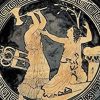Analysis The first choral ode establishes the moral and emotional background of the play by renewing the oppressive, pessimistic mood in which Agamemnon concluded. Despite her confident assertion that no more blood would be shed, Clytaemestra is beginning to realize that she will have to pay for her crime. Orestes, […]
Read more Summary and Analysis The Choephori, or The Libation Bearers: Parodos (Lines 22-82)Summary and Analysis The Choephori, or The Libation Bearers: Prologue (Lines 1-21)
Analysis This scene is unusually short because the first part of the prologue is missing in ancient manuscripts of the play. In the lost portion, Orestes probably told about Apollo’s command to avenge Agamemnon since from the outset of the play Orestes seems to regard the murder of Clytaemestra as […]
Read more Summary and Analysis The Choephori, or The Libation Bearers: Prologue (Lines 1-21)Summary and Analysis Agamemnon: Exodos (Lines 1411-1673)
The elders are stunned by Clytaemestra’s sadistic arrogance. She mocks them for having thought she was an ordinary, weak woman and cries defiantly: You can praise or blame me as you will; it is all one to me. That man is Agamemnon, my husband; he is dead; the work of […]
Read more Summary and Analysis Agamemnon: Exodos (Lines 1411-1673)Summary and Analysis Agamemnon: Fourth Episode (Lines 1019-1410)
There is a moment of silence, then Cassandra steps down from the chariot and cries out in despair that Apollo has destroyed her. The curiosity of the elders is aroused and they encourage her to continue speaking. When Cassandra realizes that she is standing outside the palace of Agamemnon, the […]
Read more Summary and Analysis Agamemnon: Fourth Episode (Lines 1019-1410)Summary and Analysis Agamemnon: Third Episode (Lines 774-965)
The elders greet their king with a frank statement intended to avoid superfluous praise yet give him the honor to which he is entitled. They remind Agamemnon of their opposition to the war but express genuine pleasure that he is home again. The elders add that Agamemnon will soon learn […]
Read more Summary and Analysis Agamemnon: Third Episode (Lines 774-965)Summary and Analysis Agamemnon: Third Stasimon (Lines 686-773)
Many people believe that good fortune results in suffering, but the elders hold another view — only evil deeds result in evil. Those who do not sin are not punished, but evil breeds more evil. Insolence and arrogant pride are resented by the gods and bring down retribution on man. […]
Read more Summary and Analysis Agamemnon: Third Stasimon (Lines 686-773)Summary and Analysis Agamemnon: Second Episode (Lines 481-685)
At this moment, a herald enters bringing definite news that the war is over. Agamemnon and the army have just landed on the beach below the city and he has been sent ahead with the message. The herald tells the elders of his happiness at being home again and describes […]
Read more Summary and Analysis Agamemnon: Second Episode (Lines 481-685)Summary and Analysis Agamemnon: Second Stasimon (Lines 367-480)
Analysis The images of this ode foreshadow the death of Agamemnon and the sorrows that will continue to afflict the House of Atreus (for example, the description of Zeus casting the net of destruction over Troy also alludes to how Clytaemestra will trap Agamemnon in a net before killing him). […]
Read more Summary and Analysis Agamemnon: Second Stasimon (Lines 367-480)Summary and Analysis Agamemnon: First Episode (Lines 270-366)
Clytaemestra gives free rein to her imagination and goes on to describe the situation in the conquered city. She visualizes the Greek army looting and pillaging in the ruins of Troy while the defeated inhabitants mourn. Clytaemestra points out that the voyage home is long and dangerous, and expresses the […]
Read more Summary and Analysis Agamemnon: First Episode (Lines 270-366)Summary and Analysis Agamemnon: First Stasimon (Lines 83-269)
The elders ponder on the suffering that so often seems to accompany divine intervention in human affairs. The problem is a perplexing one that cannot be solved although it is known that Zeus has ultimate responsibility for all that happens. They conclude, “From the gods who sit in grandeur / […]
Read more Summary and Analysis Agamemnon: First Stasimon (Lines 83-269)
